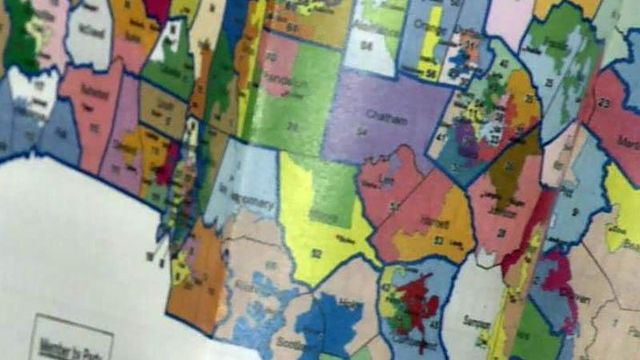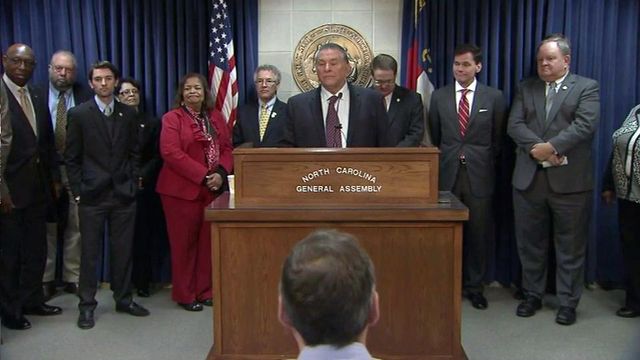Lawmakers want independent panel to draw voting maps
A bipartisan group of lawmakers said Tuesday that they plan to file at least two bills in the coming days seeking an independent commission to oversee future efforts to draw legislative and congressional voting maps in North Carolina.
Similar efforts to end partisan redistricting have failed repeatedly since the 1980s, but Rep. Paul Stam, R-Wake, said he is confident the time is right to make the move.
"Times change, people change, ideas change," Stam said at a news conference attended by dozens of lawmakers to announce the effort.
"In constructing districts, the people with the most at stake are probably ones who shouldn't be doing the details," Stam said. "It's not about squiggly lines or maps that look bad ... but it is about making the process fairer."
Voting maps have traditionally been drawn by the party in power and were drafted to ensure continued control of the General Assembly and the congressional delegation. That left many people without a voice in the political process, said Rep. Grier Martin, D-Wake, noting Republican map-makers gave him a "safe" Democratic district in 2011 in order to shift more Republican voters into adjacent districts to boost support for GOP lawmakers.
"We need to have more districts where folks are elected because they were able to build a consensus among their voters – Democrats, Republicans, Libertarians and unaffiliated – that they were the candidate who could best represent the collective interest," Martin said.
With five years until the next census, after which voting districts would be adjusted again to accommodate population changes, lawmakers said they should address the issue now, when it remains unclear which party will be in power after 2020.
More than a dozen other states have adopted similar reforms, including Ohio last year, but advocates concede it's an uphill political battle.
"It's a tough political battle, I'm not going to kid anybody about that. But North Carolina is changing very rapidly in ways that it never has in the past," said Jane Pinsky, director of the North Carolina Coalition for Lobbying and Government Reform.
Rep. Charles Jeter, R-Mecklenburg, said he wants to shift the horizon out even further to ensure passage of an independent redistricting bill.
Legislation sponsored by Jeter and Sen. Jeff Jackson, D-Mecklenburg, would wait until 2028 to create a nine-member redistricting commission, which would then start working after the 2030 census.
"Five years in politics is soon, and everyone in this room is going to be impacted if we do it in five years," Jeter said. "To me, getting it done is the most important thing."
Voters would have to pass a constitutional amendment to create the commission, and the members would be appointed by the governor, Republican and Democratic leaders in the House and the Senate, and the chief justice of the state Supreme Court, Jackson said. The commission would produce three versions of maps for congressional, House and Senate districts following 45 days of public comment. He said the General Assembly would then have 120 days to pick one of the versions for each map, and if lawmakers cannot agree on one, the commission would then select the final maps.
Senate Rules Committee Chairman Tom Apodaca predicted that, regardless of the time frame included in the bill, it wouldn't make it through the Senate.
"God bless 'em. I can't wait to get it over here," Apodaca, R-Henderson, said of a redistricting bill. "It's dead. It's not going anywhere."
Senate Republicans are divided on the need to change the redistricting process, Majority Leader Harry Brown said.
"Some feel like it should, some feel like it shouldn’t," said Brown, R-Onslow. "You know, the other side had a chance to do that for what, a hundred and some years, never did and there’s some pressure to do it. Again, I’m not sure where our caucus will be on it, but we’ll have that conversation."
Conservative and liberal groups said lawmakers need to put politics aside and do what's best for North Carolina voters.
"The voters are who our democracy is designed to work for," said Chris Fitzsimon, director of the liberal NC Policy Watch. "The idea is to create a system where voters choose their politicians instead of the other way around."
John Hood, president of the conservative Pope Foundation, said fewer safe Republican or Democratic districts should be the goal of redistricting, not maximizing political power.
"Neutral rules should be our tactic, and competitive elections should be our end," Hood said.











